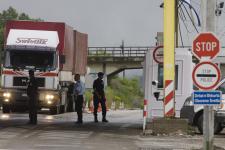 A Kosovo parliamentary commission has recommended that the government implements an embargo on Serbian and Bosnian goods as a tit-for-tat response to Serbia and Bosnia blocking and taxing Kosovo’s exports.
A Kosovo parliamentary commission has recommended that the government implements an embargo on Serbian and Bosnian goods as a tit-for-tat response to Serbia and Bosnia blocking and taxing Kosovo’s exports.
Serbia rejects the secession by Kosovo’s Albanian majority last February and has vowed never to accept it as an independent country. It is currently blocking goods that enter Serbia stamped with the seal of the Kosovo Customs authority, and has enlisted the Serb half of Bosnia to slap customs taxes on them despite a regional free trade deal.
The MPs in the parliament’s Commission for Economy, Trade and Industry asked Kosovo’s Minister of Trade Lutfi Zharku to proceed with the embargo as retaliation for the two months that Serbia and Bosnia have blocked or taxed goods sealed “Made in Kosova” , in direct breach of the CEFTA trade agreement
“All our activities have been in accordance with our international partners, from whom we have full support,” Zharku said after meeting the MPs, ” I believe that this week, or at the begining of the next week, we will explain the situation and will have a decision on the possible measures of the governemnt, that is reciprocical moves.”“
Elaborating on possible counter-measures, Zharku said Kosovo could “charge Bosnian goods with 10 percent tax and block Serbian goods, simply as they are doing with us.”
With more than 90 percent of foodstuffs coming from Serbia, analysts say the blockade could be a double-edged sword for the poorest country in Europe. In an interview for Balkan Insight two weeks ago, Zharku said consumers would not be hit directly, as “measures to prohibit imports from a certain country will be linked to the facilitation of imports from other countries, so as not to create price imbalances.”
Aside from holding up Kosovo-stamped goods at the border, Serbia is not allowing them to pass as transit through Serbia’s territory, leading to fears among Kosovo firms that they could lose their trading partners in Western Europe. Worried about the lost revenue and cancellations of orders, business leaders have asked for a clear answer as soon as possible.
Kosovo authorities have said the blockade is unacceptable because all three countries were signatories of CEFTA, which stipulates the free movement of goods and services throughout the Balkans. At the time of the signing, the United Nations mission in Kosovo, UNMIK, signed on behalf of Pristina, making it unclear whether Kosovo as a state is considered a signatory and has recourse to legal measures.
To see how it can move forward in the row, Kosovo officials asked the European Commission to clarify exactly who in Kosovo is the signatory of the Central European Free Trade Agreement — Kosovo’s government in Pristina or the UN supervisory mission.
 Eurasia Press & News
Eurasia Press & News
